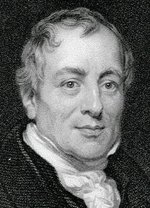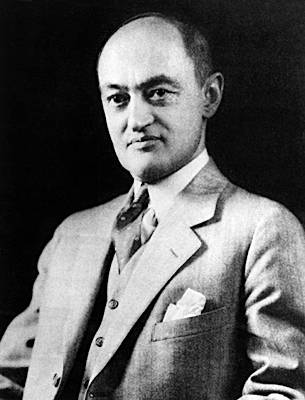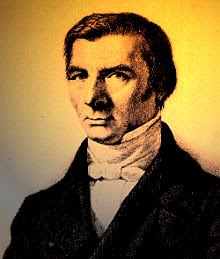The Top 10
In response to Andy's challenge earlier today, I've compiled a list of who I think are the top 10 free-market economists of all time.
There are several distinct schools and periods of economic thought that have added to the body of thought and demonstrated the superiority of free markets to command economies. These have included the classical economists, Austrian School economists, Chicago School economists and public choice theory economists.
I've constructed this list primarily on the basis of new contributions to the existing field of economic thought that has swayed the scholarship in a free-market direction. (Read: No Marx or Keynes.)
Enjoy: 1. Ludwig von Mises: Mises is the godfather. Virtually all modern free-market economists are in some way influenced by Mises' work. Mises single-handedly revived the defunct Austrian School tradition in economics while working at the Vienna Chamber of Commerce during the Interwar Period. As the Nazis rose to power, Mises recognized that his free-market theories and Jewish background would place the lives of him and his family in danger, so he left everything behind and fled to Switzerland and, later, to the United States. Many of Mises' students at New York University went on to become famous economists in their own right. Mises' magnum opus, "Human Action," is arguably the greatest inquiry into the functioning of a market economy ever written.
1. Ludwig von Mises: Mises is the godfather. Virtually all modern free-market economists are in some way influenced by Mises' work. Mises single-handedly revived the defunct Austrian School tradition in economics while working at the Vienna Chamber of Commerce during the Interwar Period. As the Nazis rose to power, Mises recognized that his free-market theories and Jewish background would place the lives of him and his family in danger, so he left everything behind and fled to Switzerland and, later, to the United States. Many of Mises' students at New York University went on to become famous economists in their own right. Mises' magnum opus, "Human Action," is arguably the greatest inquiry into the functioning of a market economy ever written. 2. Friedrich von Hayek: There's a reason the term "Hayekian" is often used to describe the laissez-faire approach. One of Mises' students, Hayek eventually won the Nobel Prize in Economics for his development of the Austrian Business Cycle Theory that explains how central banking and artificial credit are the primary causes of the business cycle. Another refugee from Nazi tyranny, Hayek is perhaps most well-known for his treatise against planned economies and the totalitarian states that they inevitably engender, "The Road to Serfdom."
2. Friedrich von Hayek: There's a reason the term "Hayekian" is often used to describe the laissez-faire approach. One of Mises' students, Hayek eventually won the Nobel Prize in Economics for his development of the Austrian Business Cycle Theory that explains how central banking and artificial credit are the primary causes of the business cycle. Another refugee from Nazi tyranny, Hayek is perhaps most well-known for his treatise against planned economies and the totalitarian states that they inevitably engender, "The Road to Serfdom." 3. Murray Rothbard: Another Mises student, Rothbard is the most prolific of all free-market theorists. In addition to his further development of Mises' Austrian School economic theories, Rothbard was a philosopher, historian and Nevadan. Rothbard is often credited with being the first to develop a comprehensively libertarian economic, historical, legal and moral worldview. While "Man, Economy and State" is Rothbard's masterpiece on economic theory, he is also well known for: "America's Great Depression," "Conceived in Liberty" - a historical account of the American colonies - "An Austrian Perspective on the History of Economic Thought," and numerous entreaties against the Federal Reserve.
3. Murray Rothbard: Another Mises student, Rothbard is the most prolific of all free-market theorists. In addition to his further development of Mises' Austrian School economic theories, Rothbard was a philosopher, historian and Nevadan. Rothbard is often credited with being the first to develop a comprehensively libertarian economic, historical, legal and moral worldview. While "Man, Economy and State" is Rothbard's masterpiece on economic theory, he is also well known for: "America's Great Depression," "Conceived in Liberty" - a historical account of the American colonies - "An Austrian Perspective on the History of Economic Thought," and numerous entreaties against the Federal Reserve. 4. Milton Friedman: Dean of the Chicago School, Friedman was easily the most influential of any free-market economist in the 20th Century. Friedman was a staunch supporter of free trade, low taxes and limited government. His ideas gained traction among political leaders across the globe. While Friedman and Anna Schwartz together won the Nobel Prize for their work in "A Monetary History of the United States," Friedman was also known for his ability to convey complex theories in a manner comprehensible to the layman (see, e.g., "Free to Choose"). Had Friedman's monetarist theories not led him to espouse the idea that government can efficiently manipulate the value of the currency through monopolistic central banking, he could have easily topped this list.
4. Milton Friedman: Dean of the Chicago School, Friedman was easily the most influential of any free-market economist in the 20th Century. Friedman was a staunch supporter of free trade, low taxes and limited government. His ideas gained traction among political leaders across the globe. While Friedman and Anna Schwartz together won the Nobel Prize for their work in "A Monetary History of the United States," Friedman was also known for his ability to convey complex theories in a manner comprehensible to the layman (see, e.g., "Free to Choose"). Had Friedman's monetarist theories not led him to espouse the idea that government can efficiently manipulate the value of the currency through monopolistic central banking, he could have easily topped this list.  5. David Ricardo: The first classical economist to crack this list, Ricardo was an 18th Century British philosopher and statesman often credited with systematizing economic theory. Ricardo's greatest gift to posterity was his ardent defense of free trade at a time when mercantilism still ruled much of Europe. He developed the theory of "comparative advantage," which is still the bedrock of trade theory.
5. David Ricardo: The first classical economist to crack this list, Ricardo was an 18th Century British philosopher and statesman often credited with systematizing economic theory. Ricardo's greatest gift to posterity was his ardent defense of free trade at a time when mercantilism still ruled much of Europe. He developed the theory of "comparative advantage," which is still the bedrock of trade theory.  6. Adam Smith: For the uninitiated, it may seem odd that Smith would rank below Ricardo on this list. The Scotsman is widely regarded today as the "father of economic science." However, if this list is about value added to the existing scholarship, then Smith does not really deserve top billing. To be sure, Smith's contributions and authorship of "The Wealth of Nations" changed the world by unleashing a tidal wave of classical liberal thought that heavily influenced the founding of the United States. However, Smith's primary contribution is that he was the first to articulate such ideas to the English-speaking world. While the classical liberal tradition of economic thought never enjoyed such purchase prior to Smith, many of his ideas had been previously developed elsewhere (see Rothbard's account of the history of economic thought).
6. Adam Smith: For the uninitiated, it may seem odd that Smith would rank below Ricardo on this list. The Scotsman is widely regarded today as the "father of economic science." However, if this list is about value added to the existing scholarship, then Smith does not really deserve top billing. To be sure, Smith's contributions and authorship of "The Wealth of Nations" changed the world by unleashing a tidal wave of classical liberal thought that heavily influenced the founding of the United States. However, Smith's primary contribution is that he was the first to articulate such ideas to the English-speaking world. While the classical liberal tradition of economic thought never enjoyed such purchase prior to Smith, many of his ideas had been previously developed elsewhere (see Rothbard's account of the history of economic thought). 7. Carl Menger: Founder of the Austrian School, he was the first to develop a cogent price theory aided by his development of the theory of marginal value. Prior to Menger, the classical economists (as well as Karl Marx) errantly subscribed to cost-of-production theories of value, including the labor theory of value. Menger recognized that a good only possesses as much value as individuals place in its ability to improve their lives (utility) and that transactions occur at prices that reflect this value. The Las Vegas housing market has recently proved Menger right all over again - once a good has been produced, its production costs will not be inherently incarnate in its future market price. Menger's "Principles of Economics" was, for decades, considered the text on economic theory.
7. Carl Menger: Founder of the Austrian School, he was the first to develop a cogent price theory aided by his development of the theory of marginal value. Prior to Menger, the classical economists (as well as Karl Marx) errantly subscribed to cost-of-production theories of value, including the labor theory of value. Menger recognized that a good only possesses as much value as individuals place in its ability to improve their lives (utility) and that transactions occur at prices that reflect this value. The Las Vegas housing market has recently proved Menger right all over again - once a good has been produced, its production costs will not be inherently incarnate in its future market price. Menger's "Principles of Economics" was, for decades, considered the text on economic theory. 8. Joseph Schumpeter: Schumpeter is best known for his coining of the phrase "creative destruction." His primary contribution to economic science was on the role that entrepreneurs play in driving innovation. In "The Theory of Economic Development," Schumpeter recognizes that technological advancement is the primary determinant for economic growth and that profit-seeking individuals provide the impetus to such advancement. Another refugee from Nazi tyranny, Schumpeter was perhaps the most influential intellectual opponent of John Maynard Keynes among his contemporaries.
8. Joseph Schumpeter: Schumpeter is best known for his coining of the phrase "creative destruction." His primary contribution to economic science was on the role that entrepreneurs play in driving innovation. In "The Theory of Economic Development," Schumpeter recognizes that technological advancement is the primary determinant for economic growth and that profit-seeking individuals provide the impetus to such advancement. Another refugee from Nazi tyranny, Schumpeter was perhaps the most influential intellectual opponent of John Maynard Keynes among his contemporaries.  9. Friedrich Bastiat: The French Bastiat was the first true "political economist." Bastiat distinguished a dichotomy of the ways in which to acquire wealth, which he termed the "political means" and the "economic means." The "economic means" is to produce wealth through industry, whereas the "political means" involves using the power of government to confiscate wealth from others. Modern theories of rent-seeking and "regulatory capture" all stem from the writings of Bastiat. It's too bad so many of his countrymen failed to understand the lessons contained in "The Law."
9. Friedrich Bastiat: The French Bastiat was the first true "political economist." Bastiat distinguished a dichotomy of the ways in which to acquire wealth, which he termed the "political means" and the "economic means." The "economic means" is to produce wealth through industry, whereas the "political means" involves using the power of government to confiscate wealth from others. Modern theories of rent-seeking and "regulatory capture" all stem from the writings of Bastiat. It's too bad so many of his countrymen failed to understand the lessons contained in "The Law." 10. Hans-Hermann Hoppe: The only living economist to make this list, Hoppe joins Rothbard as both a member of the Austrian School and a Nevadan. Hoppe turns conventional wisdom on its head by showing that monopoly power is not a natural outcome of markets and can only arise through government protectionism or interventionism. He has effectively dispelled such anti-market theories such as "natural monopoly" and anti-trust theory. In "Democracy: The God That Failed," Hoppe asserts that the primary function of government is to exploit its subjects and that this tendency is, in fact, worse when those in power serve limited terms of office.
10. Hans-Hermann Hoppe: The only living economist to make this list, Hoppe joins Rothbard as both a member of the Austrian School and a Nevadan. Hoppe turns conventional wisdom on its head by showing that monopoly power is not a natural outcome of markets and can only arise through government protectionism or interventionism. He has effectively dispelled such anti-market theories such as "natural monopoly" and anti-trust theory. In "Democracy: The God That Failed," Hoppe asserts that the primary function of government is to exploit its subjects and that this tendency is, in fact, worse when those in power serve limited terms of office.
Honorable Mention: Thomas Sowell, Jacob Viner, George Reisman, Art Laffer, Gary Becker, George Stigler, Eugen Bohm-Bawerk, Walter Williams, James Buchanan





